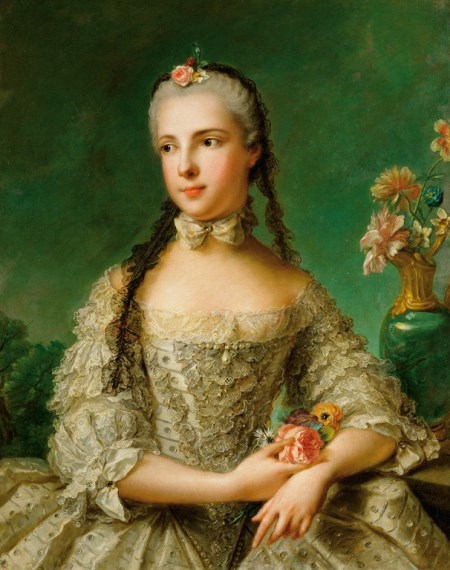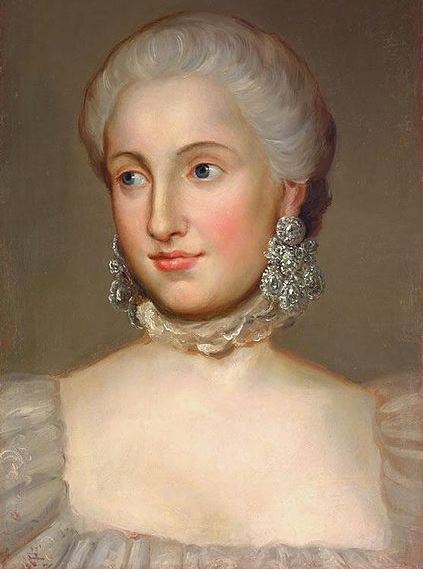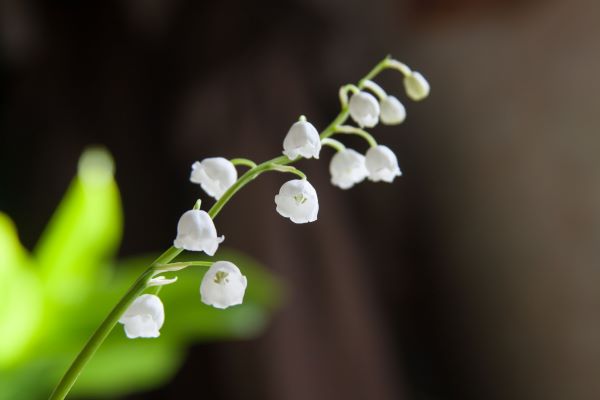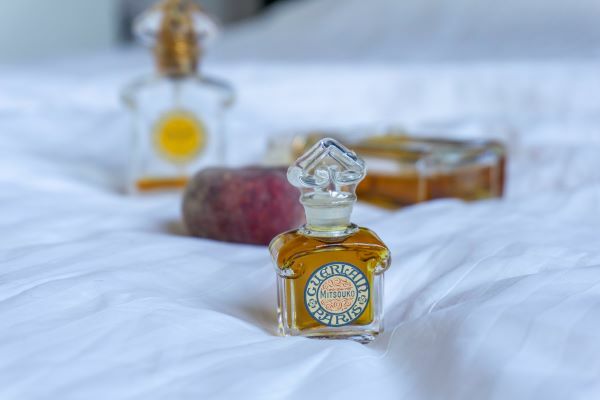I returned from my recent trip to Vienna bringing back not only an obsession with Johann Georg Pinsel, but also with Isabella von Parma (1741-1763), who lived at the same time as the mysterious 18th century sculptor. Isabella was one of the most remarkable personalities of the 18th century, admired for her achievements in art, music, and philosophy. The reason I became fascinated with her, however, was an excerpt from a letter she wrote to her sister-in-law, Marie Christine of Austria. “I am told that the day begins with God. I, however, begin the day by thinking of the object of my love, for I think of her incessantly.”
 I am once again struck by the narrow lenses through which we see women in history. In many books Isabella is repeatedly described as “mad,” “tragic,” or “odd.” People search for the roots of her melancholy moods in the family tree and discuss at length the mental problems of her father and her mother’s cold attitude. What about the fact that princesses in the 18th century were little more than breeding mares, and Isabella had half a dozen miscarriages during her short marriage to Joseph II of Austria? The couple was under enormous pressure to produce a male offspring to the Hapsburgs.
I am once again struck by the narrow lenses through which we see women in history. In many books Isabella is repeatedly described as “mad,” “tragic,” or “odd.” People search for the roots of her melancholy moods in the family tree and discuss at length the mental problems of her father and her mother’s cold attitude. What about the fact that princesses in the 18th century were little more than breeding mares, and Isabella had half a dozen miscarriages during her short marriage to Joseph II of Austria? The couple was under enormous pressure to produce a male offspring to the Hapsburgs.
In a letter to Marie Christine, she writes,
“What should the daughter of a great prince expect? Her fate is unquestionably most unhappy. Born the slave of the people’s prejudices, she finds herself subjected to this weight of honours, these innumerable etiquettes attached to greatness… In the end the effort is made to establish her. There she is condemned to abandon everything, her family, her country–and for whom? For an unknown person, whose character and manner of thinking she does not know… sacrifice to a supposed public good, but in fact rather to the wretched policy of a minister who can find no other way for the two dynasties to form an alliance which he pronounces indissoluble–and which, immediately it seems advantageous, is broken off…”*
Joseph, it must be said, experienced similar anxieties on the eve of his marriage, a desire for companionship mixed with the apprehension of marrying someone he hasn’t even seen. But Joseph was taken with Isabella, especially with her erudition, wit and learning, even if he remained too immature to fully appreciate her. Remember, he was the same emperor who complained to Mozart that his music had too many notes.
By the time she was twenty, she was already impressively accomplished, having had written several treatises on education, philosophy and military strategy. She wrote music and directed plays, painted and created interior designs, some of which can still be seen at the Schönbrunn Palace in Vienna. The complex and rich personality of Isabella comes best of all in the letters she shared with Marie Christine between 1760 and 1763.
“The confusion which reigns in a certain drawer which lives in my room, where are to be found together and without rhyme or reason a political tract, a pile of letters, a comic opera, a vaudeville, a treatise on education, a clavier part, some moral reflections. A sermon jostles a treatise on all types of foolishness, prayers are mixed up in a paper devoted to declaring my love to you, letters from the emperor muddle up with letters of a hundred persons who are indifferent to me, and with those letters which are so dear to me and constitute the sweetness of my life.”*

Historians debate whether the relationship between Isabella and Marie Christine was more than platonic, but it seems like an irrelevant discussion to me. Prince Albert, Marie Christine’s husband, collected and preserved the letters after his wife’s death as proof of Marie Christine being friends with such a brilliant personality as Isabella. (Apart from one letter, Marie Christine’s correspondence didn’t survive.) But love can come in many forms and Isabella’s letters are full of passion. When I read them, everything around me recedes, and all I’m conscious of is the strength of her emotion and longing.
“I am writing you again, cruel sister, though I have only just left you. I cannot bear waiting to know my fate, and to learn whether you consider me a person worthy of your love, or whether you would like to throw me into the river…. I can think of nothing but that I am deeply in love. If I only knew why this is so, for you are so without mercy that one should not love you, but I cannot help myself.”
“My dear angel,” “my most precious treasure,” “my consolation,” says Isabelle to Marie Christine. “I am madly in love with you, virtuously or diabolically, I love you and I will love you to the grave.”
Isabella lived but for a short time after writing that letter. She contracted smallpox and passed away at the age of twenty two. Realizing that she would soon die, she wrote to Marie Christine offering advice on how to navigate the complicated court life of Vienna and win the confidence of Maria Theresa. Isabella’s death left the entire royal family in morning for far longer than etiquette required, and Joseph never fully recovered from losing his wife and companion.
As for Marie Christine, she must have followed Isabella’s advice, because she was the only one of Maria Theresa’s daughters to make a love marriage. Her suitor was Prince Albert of Saxony (1738-1822), a handsome and impeccably educated man, but with neither riches nor throne. Their marriage was very happy, and with Marie Christine’s generous income, the couple amassed an impressive collection of art, now at the Albertina in Vienna, and build a palace in Brussels, where they resided until the revolution in 1792. The Royal Castle of Laeken is the current residence of the Belgian royal family.
Unfortunately, Isabella’s letters aren’t translated into English, and the only full version is
“Je meurs d’amour pour toi…” Lettres de Isabelle de Bourbon-Parme à l’archiduchesse Marie-Christine 1760-1763. Édition établie par Élisabeth Badinter. La Lettre et la Plume. Éditions Tallandier, 2008. The women like most of the European nobility at the time used French, although a couple of Isabella’s letters are written in German. Another source is Hrasky Josef. Die Persönlichkeit der Infantin Isabella von Parma, Mittelungen des österreichischen Straatsarchivs. 12. Wien, 1959, although Hrasky suppressed some of the raunchier letters. The princesses were not above discussing such mundane matters as hemorrhoids and chamber pots.
*The translated quotes I used in this article come from the excellent biography of Joseph II by Derek Beales, pp. 72-76.
First image: Isabella von Parma by Jean-Marc Nattier. Second: by Anton Raphaël Mengs.
















53 Comments
Klaas: A fascinating post, the day after international women’s day! To be groing up in the Habsburg dynastie would be a near impossible challenge for anyone, let alone for such an independent, intellectual spirit……thank you for sharing, even though this is also a very sad story. March 9, 2017 at 7:20am
Victoria: I realized that yesterday would have been a good day to post it, but anyway, it’s a fascinating topic anytime.
Hapsburgs did have quite a few remarkable women, not least of all Joseph’s and Marie Christine’s mother, Maria Theresa, but the irony was that even as MT broke many conventions herself, she advocated for a very subservient role of her daughters. She did love Isabella, although Isabella was very astute in reading people’s personalities, and this helped her a lot in navigating that court. March 9, 2017 at 10:02am
Liz: I loved reading this post. Thanks, Victoria. March 9, 2017 at 10:50am
Victoria: You’re welcome, Liz! March 9, 2017 at 11:16am
Jessica: What a coincidence because I’m reading about the Hapsburg monarchy for my class. Wish more history books talked about personalities like Isabella. March 9, 2017 at 10:55am
Victoria: They’re a fascinating family, sometimes morbidly so. The Spanish Habpsburgs are in a league of their own. March 9, 2017 at 11:16am
Nora Szekely: Hi Victoria and perfume lovers,
Interesting topic especially as I’m Hungarian an at the time of Maria Theresa and Joseph II Hungary was part of the Habsburg Empire.
I did not know much about Isabella Von Parma, such a fascinating personality! I may seek out her letters to get a better view of the Habsburg court life at the 18th century. March 9, 2017 at 11:02am
Victoria: If you haven’t read Beales’s book, I can’t recommend it enough. It’s mostly about Joseph II, of course, but it cover so many other topics and he describes the situation in Hungary too and the way Joseph’s policies affected Hungary. And also Belgium. He wasn’t liked here. March 9, 2017 at 11:14am
Richard Goller: A great post. Love your writing and the pics! March 9, 2017 at 11:11am
Victoria: Thank you. March 9, 2017 at 11:15am
bellaciao: Lovely post! Funnily, I just read about Isabella just last weekend and even had a look at the book! And I went on a wikipedia reading binge about Marie-Christine and her siblings:)- I am thinking of getting Elisabeth Badinters book on Maria Theresia, Isabella’s rather fierce mother-in-law. March 9, 2017 at 1:13pm
Victoria: Do get it! Badinter’s book is fantastic, and she covers many facets of Maria Theresa’s personality that others ignore.
The other MT daughter that intrigues me is Maria Elisabeth. There is so little written about her, safe for her great beauty that was completely destroyed by smallpox, to the point that she couldn’t be married like other daughters. Most historians, professional and popular, conclude that “the experience made her bitter” (well, duh!) and move onto someone else in the family. But she was quite a character! March 9, 2017 at 2:27pm
rainboweyes: A fasicinating personality indeed. When I’m not mistaken, she must have been Marie Antoinette’s sister-in-law too? March 9, 2017 at 1:19pm
Victoria: She was. Marie Antoinette wasn’t even 10 year old before Isabella died. March 9, 2017 at 2:30pm
Alexandra Fraser: Thank you for the introduction to this fascinating woman. I so enjoyed reading your post March 9, 2017 at 2:06pm
Victoria: I’m very glad to hear it. She is such a brilliant mind. Reading her reflections on education, I’m struck by how modern they are. March 9, 2017 at 2:32pm
Alexandra Fraser: It’s wonderful that we are now able to know more about these woman from the past. My current fascination is Émilie du Chatêlet – translator of Isaac Newton -and checker of all his experiments March 9, 2017 at 4:00pm
Victoria: And I ordered Élisabeth Badinter’s book on Émilie de Châtelet yesterday. I read a little bit about her, and it made me curious to learn more. March 9, 2017 at 4:04pm
Alexandra Fraser: She’s an amazing woman brilliant mathematician and party girl. Tried to write a poem about her – not easy but it came out okay-ish
Elisabeth Badinter rather an interesting and complex woman herself March 9, 2017 at 4:25pm
Victoria: I’ve only read a couple of her books so far, the one on Maria Theresa and the compilation of Isabella’s letters, and I agree with you. I’m as fascinated by Badinter herself as by the personalities she writes about. March 10, 2017 at 1:36am
Alexandra Fraser: My to-be-read list increases faster than I can read – and you talk about so many wonderful books March 10, 2017 at 2:15am
Victoria: A familiar dilemma, but a pleasant one to have. 🙂 March 10, 2017 at 3:46am
Alicia: Lovely post, Victoria. Isabella was a Spanish Infanta, born in Madrid, grand daughter of the Spanish king Felipe V (a grand son of Louis XIV), and thus she was a Bourbon (the Spanish Hapsburg branch had ended, and Louis XIV won the war against the Austrian pretender). Her mother was French, and I suspect that in those early times of the Spanish Bourbons French must have been spoken within the royal Spanish family. Her father, a Spanish Infante, son of Felipe V, was the Duke of Parma, a title he inherited from his mother. Isabella’s Spanish name was Isabel de Borbón y Parma. It is understandable if in Vienna they dropped the Bourbon having been so badly defeated by Louis XIV in a recent war. It is unfortunate that she didn’t fall in love with her husband, because Joseph adored her. Her connection with Queen Marie Antoinette, a Hapsburg, could only be as an in law, through her husband, since she didn’t have a drop of Hapsburg blood (except perhaps from a droplet through Louis XIV wife, a Spanish Hapsburg Infanta). Since the correspondence of her beloved disappeared, it is quite possible that Joseph wasn’t that pleased when he read those letters, and destroyed them. He is the only one who would have had access to them after her death. March 9, 2017 at 4:59pm
Victoria: Thank you and thank you very much for filling in the details about the historical context. I avoided it in the article itself, because these women end up defined solely in terms of which king or prince fathered them or married them, and it’s hard to see them for the personalities that they were. Of course, the lineages and marriages matter a great deal. That being said, the Hapsburg lineages are totally fascinating to read about. The Spanish Hapsburgs were so desperate to keep it all in the family that by the time they produced Charles II, he was almost completely disabled. His mother was the niece of his father, while his grandmother was his aunt!
But back to Isabella and the Austrian Hapsburgs. I doubt Joseph could have been an ideal companion for her, given that he was simply not mature enough at the time of their marriage. But clearly, he adored her and their daughter whom he called “my second me”. It’s very sad that the girl didn’t live long either. March 10, 2017 at 1:49am
Alicia: Victoria, thank you for your answer. I’d like to add that the fact that Isabella was born and raised in the Spanish court is culturally significant, since it was a peculiar tradition in the Spanish monarchy, since Isabel of Castile in the late XV century, to give the royal daughters a very thorough education. Example the unfortunate first wife of Henry the VIII of England, Catherine of Aragon, a woman of exceptional humanist culture. Isabella wouldn’t have had such an education in most of the European courts. The intermarriage of the Hapsburgs, which ended as you say in Charles II the Bewithched, was not a mere matter of keeping things in the family. Philip Ii married four times (Portuguese, English and French princesses), but only with his fourth wife, a Hapsburg, he got the desired heir. Something similar happened with Philip IV, who only produced the heir with his niece, another Hapsburg, after the death of his beloved first French wife. In both cases a Hapsburg princess was the last choice, and it was so because the fertility of the Austrian Hapsburg princesses was well known (the Valois and the Bourbons were less fertile and had many, many miscarriages). Sometimes biology is the decisive factor. Of course they knew nothing of genetics. In modern times the most catastrophic case was that of Queen Victoria, who distributed the haemophilia gene through the royal houses of Europe, most notably Russia and Spain. A Queen or a princess first duty was to produce heirs. That was her destiny and nothing was more important. Even today one can notice the expectancy of a whole kingdom when a royal child is to be born, as witnessed quite recently in the United Kingdom. March 10, 2017 at 8:26am
Victoria: Of course, many factors beyond what we touched upon were important to make Isabella who she was, but in the end, it was her personality that shone and she made the most of her talents. March 10, 2017 at 8:52am
Ariane: I’m intrigued by those extraordinary diamond earrings! (And the pearls in the Nattier portrait are impressive, too). Thank you for introducing us to this fascinating young woman. March 9, 2017 at 5:01pm
Victoria: Nattier portrait is my favorite. That gown! March 10, 2017 at 1:50am
Neva: Dear Victoria, for me,a person who is not specially interested in history, this was a very interesting read. The only way I can learn about history are amazing private lives of certain personalities. This is one of such stories and I will surely go and investigate some more about Infantin Isabella. Such a pity she didn’t live longer. She would have moved some boundaries for sure, especially if her husband was powerful and backed her up. March 10, 2017 at 8:08am
Victoria: It’s really a pity. Her writing, whether her correspondence with Marie Christine, or her explorations of philosophy, science, gender roles are so fascinating and multilayered.
Thank you. I’m glad that you enjoyed it, and I’m especially glad to hear that I inspired you to search for more info about this woman. She definitely put me under her spell. March 10, 2017 at 8:56am
Kelly: Thank you for this beautiful and interesting post. March 10, 2017 at 9:02am
Victoria: Glad that you liked it, Kelly! March 10, 2017 at 9:05am
Lydia: How fascinating! Thank you for sharing this. I wish the letters were translated to English (or that I could read them in French). The comments in this thread are fascinating as well.
It’s wonderful when figures from history come alive in one’s imagination. It’s like a faded tapestry of history suddenly turns to vivid colors and the figures in it start speaking.
I’ve been curious about Elisabeth Louise Vigée Le Brun, an artist famous for her portraits of Marie Antoinette, since the Metropolitan Museum’s wonderful exhibition of her paintings. (There’s nothing like a good museum exhibition as a starting point for self-education.) I’ve ordered the Sian Evans translation of her memoirs and I’m interested in reading the museum exhibition catalog as well. So much to learn! March 10, 2017 at 5:48pm
Victoria: My favorite historians are the ones who are able to do just that–to make people who lived in the past appear vivid, to relate their thoughts and motivations. And how much more interesting when you can read that person’s own thoughts.
Please let me know how you like Elisabeth Louise Vigée Le Brun’s memoirs. You made me curious to read them. March 11, 2017 at 3:33pm
Lydia: I definitely will! March 12, 2017 at 11:12pm
Carla: I love how these posts have branched from perfume. I enjoy the focus on beauty and art. It seems rare these days. To keep my French I was reading Anne Berest’s Recherche Femme Parfaite, but I hated it, I won’t go into why. Stupid novel! I will check out Badinter’s publication of these letters instead. Give me beauty and not cynicism for my escape! March 11, 2017 at 8:12am
Victoria: Oh, Isabella was plenty cynical, especially considering her frustration with her surroundings. Yes, she’s interesting in art and beautiful things, but her writing is not really escapist. She shares her innermost thoughts in her letters, and they run gamut from moving to cynical. March 11, 2017 at 3:30pm
Carla: Yes but it sounds like something I would like. Maybe I just want to escape from modernity sometimes with a woman who, while not of our times, I can still relate to, and maybe I find cynicism with the weight of history more engrossing. I recently enjoyed Massie’s Catherine the Great for example. Anyway, I don’t think cynical is the right way to describe Berest’s novel. Silly was more accurate I think! March 11, 2017 at 3:48pm
Victoria: Then you will enjoy them. The letters are sincere, and that’s what makes them so touching. Somehow I found it easy to relate to her. March 11, 2017 at 4:32pm
Anna Maria: I went to Vienna last year for the first time and while visiting The Albertina and all the Palaces was fascinating by the history and their lifestyles. So, I came across this blog, being a perfume lover and history, travel, beauty lover, and have subscribed for more lol.. March 15, 2017 at 8:45pm
Victoria: Thank you, Anna Maria, and welcome! We seem to share many interests in common. March 16, 2017 at 3:50am
Paul: Marie Christine (Mimi as she is known within the imperial family) shared her mother’s birthday and is her favorite, which is why she got away with marrying a virtually penniless prince. Her sister Maria Amalia wasn’t so lucky. She was practically forced to marry the Duke of Parma even though she was in love with a minor prince, Charles of Zweibrucken. It caused a permanent estrangement between Amalia and the empress. It’s worth noting too that Christine is not a favorite with her siblings for her sharp tongue and tendency to tell on them to their mother. Neither Marie Antoinette nor her brother Leopold really liked her and when she requested to visit the Petit Trianon, Marie Antoinette’s private retreat, she was refused.
Anyhow thanks for the post. It’s nice to see two of my favorite things; perfumes and history, discussed under one roof. March 16, 2017 at 12:17am
Victoria: Ah, yes, Maria Amalia has been quite unhappy with their choice of Ferdinand. It should be said that Joseph II very much supported the marriage, since Ferdinand was Isabella’s brother. Incidentally, when Marie Christine visited Amalia in Parma, she reported to her mother that her sister lost much of her beauty and glamour. Yes, that’s not atypical of her.
Anyway, Maria Theresa’s family is fascinating from many different perspectives. If you have any other recommended books on topic, please share. March 16, 2017 at 5:16am
Paul: There are many but one that I kept going to again and again is Lady Antonia Fraser’s biography on Marie Antoinette. A considerable section is dedicated to her childhood at the court of Vienna. It’s interesting to read of how the empress’ contradictory nature influenced her most famous (or infamous, take your pick) daughter. She preached wifely submission yet she forcefully ran an empire like a man. That “stroke of the masterful” is what she would pass on to her daughters Christine, Amalia and Carolina, but not Antoinette. I do recommend it if you haven’t read it yet. March 16, 2017 at 6:04am
Victoria: Maria Theresa did everything in her life, down to choosing the husband she wanted (but not her family), according to her own ideas. And she wanted her daughters to act in a very different way. Out of all her daughters, though, Mimi was able to read her the best and she enjoyed lots of privileges that others didn’t. Certainly that bred much resentment.
I haven’t read Fraser’s biography on Marie Antoinette, but I heard that it’s excellent and includes a lot of detail of the day to day life of the court. Thank you, I might have to take a look at it. March 16, 2017 at 6:59am
Victoria: By the way, this spring the gardens at the Royal Palace of Laeken are open to public for few weeks. The grounds are exquisitely maintained and look very much like they did during Marie Christine’s and Albert’s tenure. If anyone of you is in Brussels this April-May, do visit. March 16, 2017 at 7:01am
Doreen: This is fascinating! I knew nothing about her. I am consistently awed by how much the people accomplished at early ages back then. Shorter lives seemed to spur the creativity…
Thank you for this interesting post! March 18, 2017 at 7:27pm
Caro: Thank you
Isabella is great
I am writing a Book in german about isabella February 1, 2018 at 2:22pm
Victoria: Fantastic! Please keep me updated, since I’d love to read it. February 1, 2018 at 4:06pm
Dirk Mannekens: En zal dat ook in een Nederlandse vertaling worden uitgegeven ? July 26, 2021 at 5:34am
Christopher Bakes: I believe the word “bring” in your opening sentence should be “bringing.”
I have long admired the Habsburgs, particularly Maria Theresa. I was taught in grade school by a teaching Sister who took as her name “Maria Theresa” after the devout Empress. (She was our only teaching Sister without “Mary” in her name.) March 3, 2022 at 8:10pm
Victoria: Thank you so much! You’re the first person who noticed, and this post has been up for such a long time. I myself didn’t spot it.
The Habsburgs were fascinating. I wish someone would make a Netflix series about them, especially the Spanish ones. March 4, 2022 at 8:58am
Tereza: I really don’t like intimate letters that belonged to only two people being made public after people’s deaths! This right to intimacy is often violated because neither of the two people gave permission.
Anyone who publishes such intimate letters that people crave is a tabloid journalist to me. May 4, 2023 at 1:43am